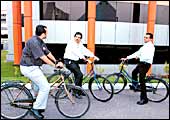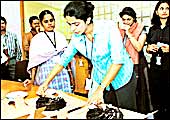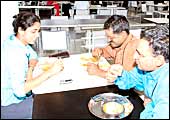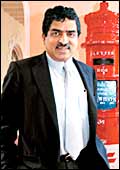SNAPSHOT
REVENUES: Rs 7,129
crore
PROFITS: Rs 1,891.67 crore |
Total employees: 46,196
Attrition (per cent): 10
Average career tenure: 2.16 years
Training budget: Not available
Training man-hours (actual): 673,462 |
When hurricane Rita tore across
vast stretches of the United States, Infosys Technologies, a very
Indian company, found itself in a position where it had to arrive
at a snap decision to evacuate some 80 employees at its Houston
Development Centre. "The decision to move these people was
taken in just 15 minutes during which time it was decided to move
these people to safe ground. People are our main assets and we
decided in a short time to charter an aircraft and get them to
safety," says Bikramjit Maitra, Head (HR), Infosys Technologies.
Implicit in Infosys' decision to do something for an employee
group as small as 80 is the desire to retain the culture of a
small company that has served it well through its 25 years of
existence. Despite having nearly 50,000 employees on its rolls
across the globe, the company tries to keep the same small-company
atmosphere as it grows into a multinational with a rich Indian
heritage. A company that began life 25 years ago in Chairman N.R.
Narayana Murthy's flat in Pune is today spread across nine locations
in India and half a dozen overseas. The company is no longer just
a software services outfit; its BPO subsidiary Progeon has nearly
3,500 seats and the company has made significant investments in
its consulting foray too. Despite expanding so rapidly, "we
like to maintain a smaller company touch and we have split the
overall business into several smaller independent units of around
4,000 people each. Every unit is almost fully autonomous and even
has its own hr arm", says Maitra. Splitting the company this
way works both ways, according to Mohandas Pai, Infosys' CFO and
Director (hr). "We have created these 15 business units to
try and foster a small company culture at Infosys and at the same
time give each division the support of being part of a large,
financially safe organisation," he explains. While Infosys
has split the company into many smaller mini-Infosyses, it has
also evolved distinct hr policies for software services, BPO and
consulting. "The people we hire in each segment are different,
so each have to be governed by its own set of independent practices,"
says Pai.
 |
 |
 |
| Shades of a winner (L
to R): Infosys' Nilekani (centre)
on the move with two Infoscions; the company's sprawling 80-acre
Bangalore campus; and a bird's-eye view of the Terminal, a
food complex that serves Infoscions with three types of cuisine |
Managing an increasingly heterogeneous group of employees doesn't
just involve complexity at the level of business units or subsidiaries.
As Infosys continues to expand globally, it involves complexity
at the level of cultures and geographies. "In the us, there's
a lot of focus on shorter workdays and upward mobility,"
says Pai. "In Europe, on the other hand, personal time is
treasured and yearly family vacations are taken seriously."
The main challenge for Infosys, according to him, is to attract
and retain some of the best talent in the world. That's easier
said than done. If, at one level, Indian vendors such as Infosys
have acquired some sort of brand equity in other countries, then,
at another, large MNCs are queuing up to expand their presence
within the country. "We believe that our global delivery
model is far superior and more proven than the strategy adopted
by our competitors, especially the multi-nationals," says
Maitra. Then, that doesn't make his job of adding numbers to Infosys'
workforce (in the first six months of this year, the company has
hired 6,000 people, taking its workforce strength to 46,196 on
September 30) any easier. "There is a battle for high-quality
talent and the challenge is to hire high-quality people. We believe
that we have an edge because we have an open, transparent culture,
and we invest heavily in training and leadership," adds Pai.
Indeed, over the past decade Infosys has emerged, arguably, India's
most desirable recruitment brand with an average of one million
resumes being processed by its hr department every year. And in
addition to being a much sought after employer, Infosys also manages
to retain people for at least a couple of years once they sign
on the dotted line. "We believe that our attrition rate (around
10 per cent), which is half the industry average, is among the
best in the industry," says Maitra.
A DAY
IN THE LIFE OF
PAYAL RAI, 32 Senior Project Manager/Infosys
Technologies |
 |
| An impromptu birthday bash gives Rai
(front) a break from work |
 |
| With a conference call looming, it's
time for a quick lunch with two colleagues |
For Payal Rai, 32, a senior project
manager at Infosys Technologies, there are some memories of
the now $2-billion (Rs 9,000-crore) company that refuse to
go away. They include the time when Infosys Chairman and Chief
Mentor (and then CEO) N.R. Narayana Murthy stood in a lunch
line; when Hosur Road was a manageable single-track path to
Electronics City; and when the company itself had just 1,000
employees working out of one building. That was in 1995 when
she first signed on with the firm. A decade on, a lot has
changed for Rai. "I definitely miss Infosys as a small
company, but on the other hand I am proud to be part of its
phenomenal growth story," she tells me as she lugs her
laptop to a conference room to start a call with a colleague
in Australia. The conference call happens after a quick 30-minute
lunch break at the Terminal, a two-level food complex that
services three kinds of cuisine. "Project managers have
been given laptops recently and with the kind of traffic we
have to wade through, it's really useful for us to start the
day early," Rai says, after the call (for the record,
Rai is at "work" by 8 a.m.).
A little later, Rai and I are ushered into a conference
room, where an impromptu birthday party for two Infoscions
is on. "This is a chance for us to step away from our
schedules to meet up for a few minutes," says Rai (who
is here because the two people whose birthdays are being
celebrated are part of her group). "While we may all
work in the same group, different schedules mean that we
rarely get to spend time together." Then, it is back
to work, work and more work (Rai's day typically ends at
6 p.m.).
|
While Infosys has evolved into a $2-billion company (it will
close 2005-06 with at least that much in revenues; its revenues
for the April-September period already tot up to Rs 4,366 crore,
just under $1 billion) in 25 years of existence, it has also had
to face criticism that its founders still continue to hog senior
management positions (four of the six people who founded the company
still hold executive posts). In the recent past, senior execs
like Hema Ravichandar, Group Head (hr), and Basab Pradhan, Head
(Sales), have quit when faced with an apparent glass ceiling.
The company's President, CEO and MD Nandan Nilekani is quick to
defend the company. "Infosys was started by first generation
entrepreneurs who have worked under someone and know the problems
faced by software pros," he says, adding that the company
is a meritocracy and his children aren't expected to join the
company as a rule. While the days of catching Chairman Murthy
at the canteen for breakfast or lunch or walking unannounced into
Nilekani's cabin may now be things of the past, there are other
things Infosys is doing to maintain its reputation as one of the
country's (and according to company execs) the world's best employers.
This includes the creation of perhaps the world's largest training
facility at the firm's 270-acre campus in Mysore, Karnataka, after
an internal assessment highlighted the need to groom a stronger
second- and third-tier management. "We have to enable our
second and third line of management to become effective leaders,"
says Pai, while Maitra points out that the company has to invest
in nurturing employees not just from India but nationals from
some 40 countries who work at Infosys and are valued at over $6.4
billion (Rs 28,800 crore) by the Lev and Schwartz model popularly
used to measure human capital. "We want to grow, but we want
to keep the core character of Infosys intact when we do,"
says Maitra.
His reference is to the soul of the company and that is very
much in evidence one rainy Wednesday afternoon when a group of
Extratelestrials (that isn't a typo; groups typically have names
drawn from customers) decide to take a quick break between back-to-back
meetings and celebrate some birthdays, even though the actual
dates were a week or more ago. "We have these events regularly
to try and create a sense of belonging among employees, especially
new inductees," says Payal Rai, 32, a 10-year veteran of
the company. Unlike some other companies, these events do not
involve a whole lot of planning and involve just a 10-15 minute
break, a quick chat over cake and Coke (or Pepsi), and an even
more rapid return to work. Nilekani himself tries to keep in touch
with delivery managers, meeting them as often as his schedule
permits and spending an hour or more in each meeting. "Infosys
seeks to foster an open, transparent culture," says Pai.
While hr execs such as Maitra may have been able to meet with
every employee a decade or more ago (when the workforce numbered
just around 1,000), technology now helps them prepare individual
career paths for Infoscions. "That's something that stands
out for me about Infosys," says Rai. "Employees can
choose at what pace they want to run their career. I have chosen
not to run at break-neck speed, but the company is okay with that."
Despite overseeing a company with such a large workforce (and
despite whet this writer mentioned earlier in this article), Nilekani
insists that his door is open all the time for suggestions and
comments. As if on cue, two over-eager recruits nearly ruin a
photo-shoot for this article when they rush over to Nilekani to
shake hands with someone they have "admired for many years".
A patient Nilekani then steps away from the interview to spend
a few minutes with the techies. Employees come first, you see.
Then he returns and smiles for the camera. The brand matters too.
INTERVIEW/NANDAN
NILEKANI/PRESIDENT, CEO AND MD
"Infosys is a fair and democratic
employer" |
 Infosys
CEO Nandan Nilekani speaks to BT's Rahul
Sachitanand on the company's people practices. Excerpts: Infosys
CEO Nandan Nilekani speaks to BT's Rahul
Sachitanand on the company's people practices. Excerpts:
Is the employee profile of Infosys changing as it transforms
itself into a multi national company? How do you manage
such a wide cross-section of people?
We are recruiting people all over the world today; we are
hiring people for our Chinese operations, Infosys Australia,
consulting operations and freshers from American colleges.
We have around 1,000 foreigners and this will increase significantly
over the next decade as Infosys becomes a truly global company.
While Infosys has evolved to a company of over 46,000 people,
we have learnt to identify our core values at Infosys and
build our people practices around them.
How critical is it for a company like Infosys to develop
a strong middle management? Do mid-managers have a long-term
career at the company?
Infosys is a professionally run company and the founders
are all first-generation entrepreneurs. None of our children
will inherit the company, so we have to focus on developing
the next generation of leaders. Initiatives such as the
investment in the Learning Centre in Mysore are part of
the plan to create a second rung of leadership that can
take over at the right time. I don't believe that there's
any limit to how high a professional manager can go at Infosys.
We give employees a fair chance to grow and share in wealth.
Infosys' founders continue to hold several key management
posts 25 years after the company was formed. Do you need
to democratise top management?
Infosys is a fair and democratic employer and no one is
being held back from their natural career growth path.
You have over 46,000 employees today. How do you keep
an individual Infoscion from getting lost in the crowd?
We have to drive the benefit of both scale and the spirit
of "smallness" that we try and foster within Infosys.
We have broken up the company into several smaller units
and I try and meet as many people as I can personally. There
is a defined career path for each Infoscion and senior managers
will mentor them on reaching their targets.
|
|









 Infosys
CEO Nandan Nilekani speaks to BT's
Infosys
CEO Nandan Nilekani speaks to BT's